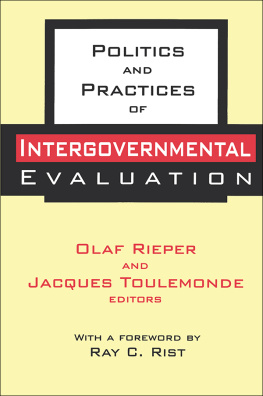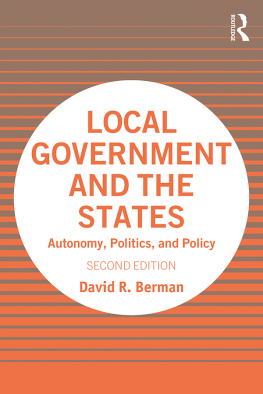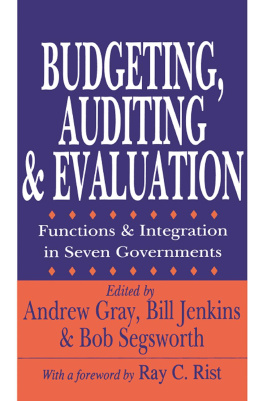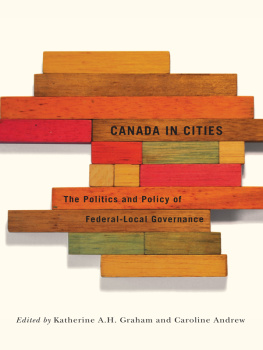POLITICS AND PRACTICES OF INTERGOVERNMENTAL EVALUATION
Comparative Policy Analysis Series
Ray C. Rist, Series Editor
Program Evaluation and the Management of Government,
edited by Ray C. Rist
Budgeting, Auditing, and Evaluation,
edited by Andrew Gray, Bill Jenkins, and Bob Segsworth
Can Governments Learn?
edited by Frans L. Leeuw, Ray C. Rist, and Richard C. Sonnichsen
Politics and Practices of Intergovernmental Evaluation,
edited by Olaf Rieper and Jacques Toulemonde
First published 1997 by Transaction Publishers
Published 2017 by Routledge
2 Park Square, Milton Park, Abingdon, Oxon 0X14 4RN
711 Third Avenue, New York, NY 10017, USA
Routledge is an imprint of the Taylor & Francis Group, an informa business
Copyright 1997 by Taylor & Francis
All rights reserved. No part of this book may be reprinted or reproduced or utilised in any form or by any electronic, mechanical, or other means, now known or hereafter invented, including photocopying and recording, or in any information storage or retrieval system, without permission in writing from the publishers.
Notice:
Product or corporate names may be trademarks or registered trademarks, and are used only for identification and explanation without intent to infringe.
Library of Congress Catalog Number: 96-30780
Library of Congress Cataloging-in-Publication Data
Politics and practices of intergovernmental evaluation / edited by Olaf Rieper and Jacques Toulemonde ; with a foreword by Ray C. Rist.
p. cm. (Comparative policy analysis series)
Includes bibliographical references and index.
ISBN 1-56000-256-5 (alk. paper)
1. Central-local government relationsEvaluation. 2. Federal governmentEvaluation. 3. Political planningEvaluation. I. Rieper, Olaf. II. Toulemonde, Jacques. III. Series.
JS113.P64 1996
351.093dc20 96-30780
CIP
ISBN 13: 978-1-56000-256-7 (hbk)
One of the challenging and intriguing difficulties of research is to recognize that which is right in front of you. The research impulse is to seek out the nuances, the idiosyncratic, and the obscure. The self-evident is ignored.
This difficulty has not escaped the evaluation community. Great intellectual effort has gone into the development of sophisticated designs and methodologies for the study of individual policies, programs, and projects. Costly efforts to find the smallest evidence of a policy or program impact are undertaken in the presumption that such data are central to policy decision making. The emphasis has been overwhelmingly to find discrete impacts from discrete governmental initiatives. Indeed, in the United States, the most frequently used term when discussing evaluation is to refer to program evaluation, that is, the study of an individual initiative or activity.
What has been ignored in the evaluation community is the fact of the intergovernmental nature of political and policy governanceregardless of which specific nation state one might choose. Whether it is Canada, the United States, England, Denmark, Sweden, Germany, Japan, or any other of the industrial countries, the governmental structure is essentially a web of interrelated policies, programs, and projects. The political mosaic has both vertical and horizonal components, but it is, indeed, a mosaic. Understanding local responsibilities and requirements for funding housing construction, for example, necessitates also an understanding of the role that regional and national governmental agencies and administrations also play in the scheme of housing. The same can be said for transportation, energy, health care, telecommunications, and on and on.
The point, quite simply, is that governance in complex democratic societies necessitates the coordination and cooperation of multiple levels of government. Sometimes, there is duplication and overlapping levels of jurisdiction, at other times it is more neat. But the totality of governing agencies at whatever level are woven together into a political system. It is the nature of this system that it is inherently intergovernmental. There are areas where one level of government has most if not sole responsibility for a governance function, but these are noteworthy by their being the exception. In their totality, democratic systems embrace local, regional, and national levels of governance; they embrace multiple sectors of public activity and responsibility; and authority to act is portioned out via an intricate set of regulations, laws, judicial rulings, and constitutional requirements.
If the above is at all accurate as a quick sketch of the system of governance in democratic political systems, then the appearance of this volume, The Policy and Practice of Intergovernmental Evaluation, merits special attention. It does so for two reasons, each of which would by itself be sufficient justification for the publication. Taken together, this book becomes both the benchmark and landmark for work in the area of the evaluation of intergovernmental policies, programs, and projects.
First, it has taken on directly the issue of intergovernmental evaluation, a topic that seems to have illuded the attention of the evaluation community for the past thirty years. Major textbooks in the field do not address the topic. It is not, for example, listed in the index of either Rossi and Freemans opus, Evaluation (5th edition) or in the index to Pattons volume, Qualitative Evaluation and Research Methods (2nd edition). Further, and this is most telling, it is not listed as one of the topics or concepts discussed by Michael Scriven in his recently published, Evaluation Thesaurus, a more than 400-page treatment of the key terms in evaluation.
The irony of this should not be lost. Evaluation has grown and matured as a response to the needs of the public sector in general and the policymaking community in particular. What appears to have emerged over these past decades is a situation where the policy community did not ask and the evaluation community did not offer. Both may intrinsically have well understood the difficultly in moving into intergovernmental issues. The policy community has had reason to shy away for in this realm, accountability is diffuse and fractured, the demands for coordination and cooperation are large, and the evidence of successful outcomes and impacts are hard to demonstrateas the chapters in this present book make clear. Further, it is hard for any individual politician or policy maker to take much credit for what outcomes are achieved. The diffusion of responsibility across levels of government and across multiple actors in the policy arena means any claim to fame is hard to make. From their vantage point in making the political calculations, there are too many players and too little visibility.
The evaluation community has also not stepped forward to take the lead in this area. Intergovernmental programs make for a most difficult set of circumstances for evaluators. To wit: there are often diffuse sets of goals at different levels of government (quite deliberately done to ensure the acceptance of the initiative at the different levelsallowing each level to interpret the intentions to their own advantage); there are different sets of players who have different sets of expectations for the policy or program and will define success in their own terms; the data systems are not aligned across levels of government to ensure some degree of consistency in measurement and tracking of performance; and the range of stakeholders can vary so considerably at different governmental levels that achieving consensus on the goals and objectives of the evaluation itself will inevitably be difficult and maybe impossible. In the face of these circumstances, the evaluators quietly slip back into the comfortable environs of studying individual policies, programs, or projects, and turn away from the complexity of the intergovernmental system.










